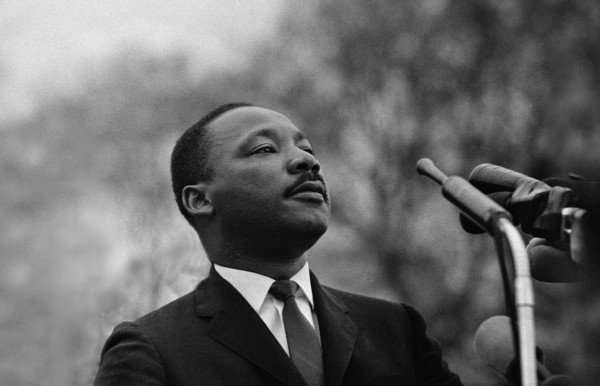Oregon Food Bank remembers Martin Luther King Jr.
Oregon Food Bank remembers Martin Luther King Jr.
January 21, 2019 – In the months leading up to his assassination, Reverend King was busy organizing the Poor People’s Campaign. He understood that civil rights were necessary, but insufficient, for creating equality and the beloved community that he dreamed about and gave his life for. Dr. King looked across America and saw people and families of all races, cultures and communities that were hungry, houseless, unemployed and underpaid. He began to organize a multi-racial movement of people to dismantle the systems of inequality that created conditions of poverty for so many communities.

MONTGOMERY, AL – MARCH 25: Dr. Martin Luther King, Jr. speaking before crowd of 25,000 Selma To Montgomery, Alabama civil rights marchers, in front of Montgomery, Alabama state capital building. (Photo by Stephen F. Somerstein/Getty Images)
In his last Sunday sermon, Dr. King spoke about the Poor People’s Campaign bringing their concerns to Washington DC:
“We are coming to demand that the government address itself to the problem of poverty. We read one day: We hold these truths to be self-evident, that all men are created equal, that they are endowed by their creator with certain inalienable rights. That among these are life, liberty, and the pursuit of happiness. But if a man doesn’t have a job or an income, he has neither life nor liberty nor the possibility for the pursuit of happiness. He merely exists … We are coming to ask America to be true to the huge promissory note signed years ago.”
Dr. King was killed before the campaign could realize its full potential. But, the Poor People’s Campaign brought about an expansion of school meals and Head Start programs for children in the south, it caused the United States Department of Agriculture to release surplus food commodities to the country’s poorest counties, it expanded the food stamp program and made the welfare system easier to navigate. And also importantly, it has served as a moral compass for the country ever since.
At Oregon Food Bank, we hold people experiencing hunger and food insecurity in Oregon and SW Washington at the center of our actions and decisions. We envision a community where each person can participate, prosper and have access to food that is both nourishing and in keeping with their culture. We recognize that systemic injustices exist – such as racism, classism, and sexism – and that these create and perpetuate conditions that sustain poverty and hunger.
Understanding this, we commit to serve marginalized communities, in both urban and rural environments, in ways that value who they are and their lived experiences. We resolve to listen to and include these communities in our work, and to respond where bias and inequities appear. We will confront oppression and poverty by developing solutions to hunger that are community-driven, honor a diversity of needs, and value everyone. Our food programs and public policy efforts aim to build a society where everyone can thrive – celebrating our differences and working together to overcome injustices that might divide us…because no one should be hungry.
The Oregon Food Bank community, including our partners, supporters and volunteers, provides tremendous relief to people experiencing poverty every day. 260,000 hungry people get access to healthy, fresh food each month through our collective efforts. Although Oregon’s rate of hunger is finally starting to decline, we still have one of the highest rates of hunger in the country. The work we do every day is necessary and critical – and it is also insufficient. Our collective mission is to end hunger AND the root causes of hunger. Together, we work as hard as we can to make sure that everyone who is hungry today has food today. And at the same time, we are working to change conditions and policies so that hunger no longer exists.
Tomorrow, the Oregon legislature begins its important work. Oregon Food Bank will be in Salem along with our elected representatives to help create policies and budgets that dig deep in to the root causes of hunger in Oregon. At the top of our agenda are some of the same issues that Dr. King and the Poor People’s Movement were fighting for in 1968: increasing housing access and stability, increasing food security for communities and investing in safety net programs that buoy our families during rough times.
Oregon Food Bank clients have told us that rent instability is a leading cause of hunger in Oregon. As a result, we have helped to pass local, regional and statewide measures designed to increase the amount of affordable housing in the state. Now it’s time for Oregon to take another step towards ending the housing crisis by increasing protections for renters. Tenant protections and rent stabilization go hand in hand with ending hunger.
Poverty is not inevitable. Hunger is not inevitable. Homelessness is not inevitable. In the words of Dr. King, “the time has come for us to civilize ourselves by the total, direct and immediate abolition of poverty.” It’s not going to be easy, but together we can do it.
